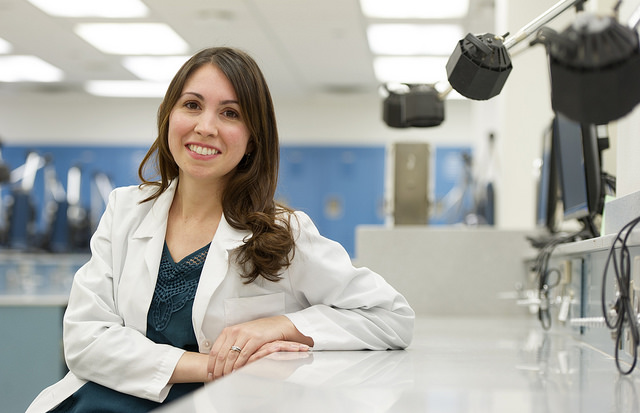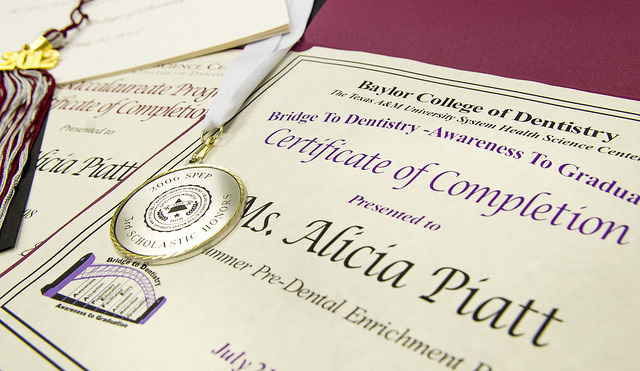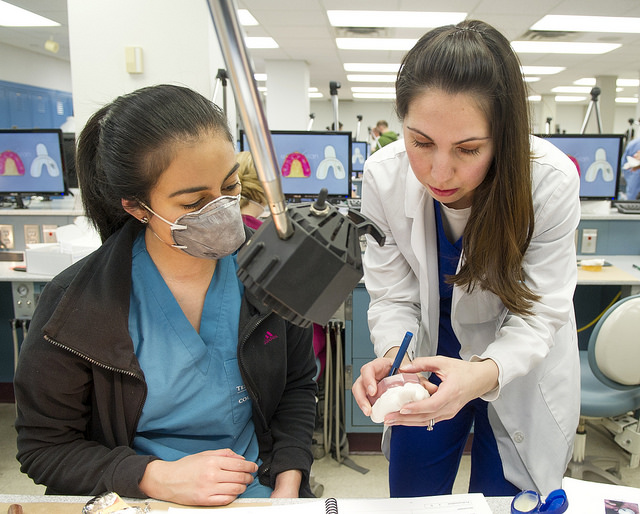Coming full circle

This former multi-year pre-dental summer program participant went on to graduate from TAMBCD in 2012. Now she’s returned to her alma mater to teach potential dental students in the same programs that launched her own professional path.
Dr. Alicia Spence has a habit of holding onto things. She’s no pack rat, though; she merely apportions a handful of mementos that hold significant meaning. Like the file she keeps tucked neatly in the desk drawer of her office at Texas A&M University Baylor College of Dentistry.
At the top of the stack is her acceptance letter to the dental school’s Summer Pre-dental Enrichment Program. The date on the corner reads 2006, but the paper is still crisp.
Then a kinesiology major at Rice University in Houston, Spence was headed into her senior year, and while she had shadowed her family’s longtime dentist in their hometown of San Antonio, she needed to experience more in dentistry before deciding to pursue the field. The six-week SPEP program seemed made to order, with hands-on experiences of all kinds and study skills enhancement to boot.
“I remember walking to Room 134 for our orientation, and Dr. Lacy was there to welcome us,” Spence recalls. “She said something during the orientation about this being the first step in our dental career. I carried that with me into my last year at Rice.”
The program offered confirmation for Spence. The health care profession was one she had contemplated since childhood, when her patients were her teddy bears and their bandages the toilet paper hastily pulled from the bathroom roll. There was just one problem: Her coursework at Rice didn’t give her the science background she needed to be competitive as a dental school applicant.
She interviewed at the UT Health Science Center School of Dentistry in San Antonio and at TAMBCD. She soon learned that while she hadn’t been accepted as a dental student to TAMBCD, she did have the option to enroll in the dental school’s Post-Baccalaureate Program. This yearlong curriculum enhances applicants’ test-taking and learning skills, so that upon successful completion participants gain admission to the school.
“The stakes were high. I knew I had this chance to get into dental school, but I had to prove myself for an entire year,” says Spence, who relocated to Dallas, simultaneously taking courses at TAMBCD and UT Dallas. It was trying and difficult and a good lesson in time management; one that ultimately prepared her for her first year of dental school.
Spence’s certificate of completion from the post-bac program is next in that file cabinet folder. She also has the roster of all her classmates who were honored alongside her at the completion ceremony that summer day in 2008.

Each year, approximately 16 students are accepted into the post-bac program. Spence is among the ranks of 133 Texas residents to successfully complete the program since its founding in 2002. Of those, 74 have graduated from TAMBCD, and 53 are current students.
Spence earned her dental degree in 2012. What makes her unique is not her path to dental school in and of itself, but what she has chosen to do since getting her degree. In 2014, after working for a mobile practice treating patients with special needs, Spence returned to the dental school as a clinical assistant professor in restorative sciences and as SPEP director, which makes her the first graduate of the SPEP and Post-Baccalaureate programs to return to teach in this very capacity.
“Many post-bac students go on to become TAMBCD students and alumni,” says Dr. Ernie Lacy, executive director of the Office of Student Development and Multicultural Affairs. “A few have come back to teach part-time here at the college. Alicia is the first who has joined my office on a full-time basis.
“She has the ‘heart of a teacher.’ Alicia appreciates the opportunity she was given as a participant in both the Summer Pre-Dental Enrichment Program and the Post-Baccalaureate Program. She wants to ‘pay it forward’ by mentoring and working with current program participants.”
This includes students like Chelsea Hooper, now a D1. She first met Spence as a participant in the SPEP collegiate program in 2014. She found the soft-spoken professor to be helpful and reassuring, yet direct. But there was something else that stuck out to Hooper.
“I remember most how she made me — and the rest of our program participants — feel important even as predental students. Don’t get me wrong; she would critique and grade us intensely against clinical expectations, but she was very thorough in explaining each step.
“When I learned that she had also participated in the TAMBCD pipeline programs, I had this self-actualizing ‘this could be me’ moment. It was so cool to see Dr. Spence, someone who had completed the same programs and had matriculated through this institution successfully, become the dentist, professor, program director, mommy- extraordinaire that we see today. It was an inspiration.”
In addition to her role heading up the SPEP collegiate program, Spence instructs D1s in the dental materials lab, D2s in the removable prosthodontics lab and D3s in the occlusion lab. She ushers them from the outset of their dental careers, often fraught with insecurities about hand skills, and witnesses their transformation to excited, confident professionals. Spence lends assistance out of the lab, as well.
Like with the annual GRACE luncheon, a student-led event honoring the college’s staff. The effort is what allowed D3 Ken Nwankwo, a former SPEP participant and fellow of the master’s in education for dental health professionals program at the college, to work with Spence as colleagues toward a common cause.
“The cool thing about Dr. Spence is, she has been in SPEP and post-bac. Not only does she know the rigor, she knows what the students are going through, and she can vouch for it,” says Nwankwo. “That speaks to the opportunities that SPEP can give to people, and what post-bac can give to people.”

In fact, the office has successfully met one of its goals: seeing its pipeline participants get into dental school. Within SPEP specifically, more than 80 percent of the 429 participants from 1997 to 2014 have been accepted into dental school.
There’s another document in that file of keepsakes, this one a bit more recent than the others. Spence has printed an email from a former student, received just the day before. In it is news that the student was accepted to the dental school of her choice.
“When we get those our whole office does this little happy dance, because we are trying so hard to help these students be successful,” says Spence. “Every time we get another one of those emails, it is the most rewarding part.”